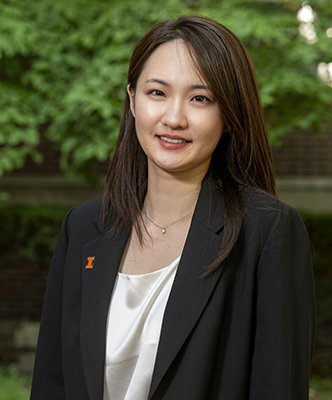Oct 1, 2024
For Stacey Choy, Gies Business offers “the ideal environment”
Look around the students and faculty who gather in the Lincoln International Atrium in the Business Instructional Facility of Gies Business, and you’ll see people from across Illinois and from around the world. Listen in, and you’ll hear several languages other than English wafting through the air. This just shows that Gies College of Business, like much of the University of Illinois Urbana-Champaign, is a diverse place, welcoming people from different backgrounds and places of origin.
For Stacey Choy, a new faculty member in the Department of Accountancy, this is just what she wants to see. “Diversity here, both among the students and faculty, is something that I really like,” she said. “As an international scholar, being able to connect with people from different backgrounds means a lot to me.”

For Choy, the diversity can be even beyond the background of individuals – it can also be the approach to research. “One thing that I realized during my PhD studies is that different methodologies matter. They can bring something unique to the table. I really wanted to collaborate with people who are working in different fields and working in the different methodologies. What is really wonderful about the Department of Accountancy at Gies is that they are excellent at many different areas and methodologies. This the ideal environment for me.”
In her research, Choy brings unique, innovative methodologies to bear on accounting and finance questions. One recent study “Private Communication between Managers and Financial Analysts: Evidence from Taxi-Ride Patterns in New York City” examined private communications between managers and financial analysts. For this study, Choy constructed a creative process for measuring face-to-face private communications between firm managers and sell-side analysts. Using data from by mapping New York City taxi trip records to company and brokerage locations. She looked at the earnings announcement dates (EADs) for companies and then mapped detailed, large-volume taxi trip records in New York City using the GPS coordinates of companies and brokerages. The data showed that the increase in ride volumes before EAD could help explain analysts’ downward adjustment of near-term earnings forecasts to create small positive earnings surprises.
“A limitation in this study is that there is no passenger information,” Choy said. “We did a lot of validation tests. There was a clear increase in rider volume around the time of earnings announcements. We can argue that such increases could not be just random. There was something going on between managers and analysts.”
Her research primarily focuses on the intersection of accounting and finance. “The line between the two can often be blurry in the literature," Choy explained. “There’s a lot of overlap. I’m particularly interested in how regulatory enforcement shapes firms’ investor communication practices around earnings announcements and the resulting impact on capital markets.” In her dissertation, Choy explored whether firms can create a more level playing field for investors by voluntarily restricting private communications before earnings announcements. Her findings suggest that, in a stricter regulatory environment, voluntary non-private disclosures can reduce information asymmetry among investors.
This fall Choy will be teaching ACCY 302: Decision Making for Accountancy. “I taught a similar course at the University of Toronto when I was a PhD student,” Choy said “No matter which country you’re in, the core concepts remain the same. The beauty of this course is that the concepts can be applied universally in various managerial decision-making processes.
Choy received her bachelor’s degree in business and economics and master’s degree in accounting from Seoul National University in South Korea. She received her PhD in accounting from Rotman School of Management at the University of Toronto. She is a Certified Public Accountant.
